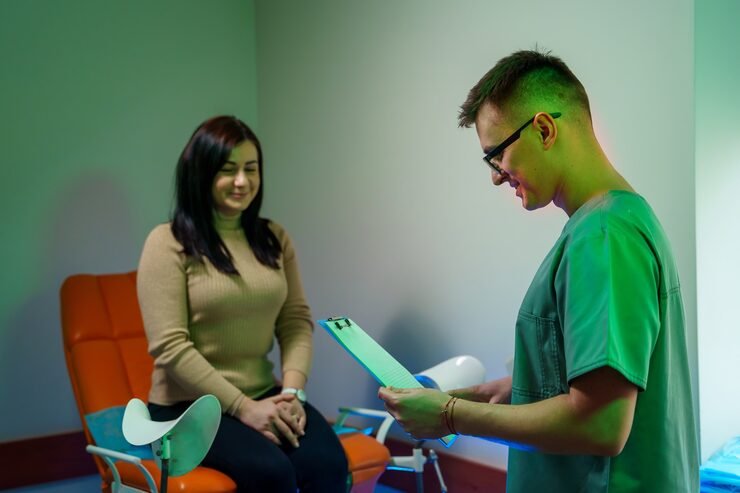Table of Contents
- Introduction
- What Is a Mental Health Technician?
- What Does a Mental Health Technician Do?
- Skills and Qualities Needed for Success
- How to Become a Mental Health Technician
- Mental Health Technician Certification Options
- Education and Training Requirements
- Mental Health Technician Jobs: Settings and Employers
- Mental Health Technician Jobs Near Me: Where to Search
- Mental Health Technician Salary: How Much Does a Mental Health Technician Make?
- Career Growth Opportunities in Mental Health
- Challenges Faced by Mental Health Technicians
- Rewards of Working as a Mental Health Technician
- Future Outlook for Mental Health Technician Jobs
- Conclusion
- Top 5 FAQs
1. Introduction
Mental health is now an important aspect of health systems across the world. With an increasing awareness of anxiety, depression and substance use disorders and other mental health issues The demand for qualified professionals is greater than ever before. A single of the vital essential positions in mental health is the one of a Mental Health Technician.
If you’re looking into careers in the field of mental health pay ranges, salary or requirements for training this guide will give you all the information needed to help you begin or build you career within this lucrative sector.

2. What Is a Mental Health Technician?
An Mental Health Technician (also called a psychiatric tech or a behavioral health tech) is a professional with a degree who assists psychologists, psychiatrists and nurses in providing care for patients suffering from mental, emotional, and behavioral mental health issues.
They interact directly with patients, usually providing support in person, observing the progress of patients, and making sure that they are safe in the clinical setting.
3. What Does a Mental Health Technician Do?
The responsibilities for a psychiatric professional depend on the work environment in which they work The most frequent responsibilities are:
- Assisting patients in their daily tasks (eating and bathing, as well as exercising)
- Monitoring the behavior of patients and reporting changes to medical personnel
- Therapeutic activities that aid in healing including group sessions
- The administration of medication under supervision
- Insuring a safe and secure environment
- Documenting patient progress
If you’ve ever asked yourself, “What does a mental health technician do?” ?”–the response is straightforward that they provide vital assistance to ensure that treatment is effective and a lot of fun.
4. Skills and Qualities Needed for Success
To be successful as a mental health worker, you will need:
- Compassion and empathy
- The ability to endure tension
- Strong communication skills
- Capability to document and observe the behavior of others
- Collaboration in clinical settings
5. How to Become a Mental Health Technician
If you’re wondering, “How to become a mental health technician?” Here are the most important steps:
- The majority of jobs require at minimum an high school diploma, for advanced positions, it is recommended to have the bachelor’s or associate’s degree in nursing, psychology, or similar areas.
- Training – On-the-job or special programs can help you develop the practical skills.
- Certification is not required in all cases, earning certification can boost your chances of getting a job.
- Experience – Internships or volunteering in mental health facilities is beneficial.
6. Mental Health Technician Certification Options
Although not always required it is a sign of professionalism and proficiency. The options include:
- American Association of Psychiatric Technicians (AAPT) accreditations (Levels 1 through 4)
- Certified Behavioral Health Technician (CBHT) credential
- State-specific licenses depending on employer requirements
Incorporating “mental health technician certification” in your resume will increase your career prospects and increase the potential for salary.
7. Education and Training Requirements
The majority of mental health technician jobs need:
- Diploma from high school (or GED (entry-level)
- A postsecondary certificate or an associate’s degree in mental health, psychology or health care (preferred)
- CPR as well as First Aid Training
- Training in crisis intervention (sometimes necessary)
8. Mental Health Technician Jobs: Settings and Employers
Jobs for mental health technicians exist in a range of locations, including:
- Hospitals for psychiatric disorders
- General hospitals
- Residential treatment centers
- Substance facilities for the treatment of abuse
- Correctional facilities
- Community health centers
9. Mental Health Technician Jobs Near Me: Where to Search
If you’re in search of jobs for mental health technicians in my area, think about:
- Websites for hospitals (direct applications)
- Job boards like Indeed, Glassdoor, ZipRecruiter
- Health staffing agencies
- Portals for employment in the state of Michigan, which include prisons and hospitals
10. Mental Health Technician Salary: How Much Does a Mental Health Technician Make?
The most frequently asked question is “How much does a mental health technician make?”
According to the most recent statistics on labor:
- Average earnings: $36,000-$48,000 annually
- Starting-up pay of $15-$17 an hour
- Technicians with experience: $20 to $25 per hour
- Most lucrative salaries: More than $55,000 a year (in metropolitan hospitals or in specialized facilities)
Pay-related factors:
- Location (urban vs rural)
- Experience and accreditation
- The type of employee (hospital or community centers)
11. Career Growth Opportunities in Mental Health
Many mental health specialists move on to other positions, like:
- Licensed Practical Nurse (LPN)
- Registered Nurse (RN)
- Psychiatric Nurse
- Mental Health Counselor
- Social Worker
12. Challenges Faced by Mental Health Technicians
- Stress and emotional strain from working with patients who are in crises
- The risk of burnout in the workplace
- Work that is physically demanding (assisting patients, directing crises)
13. Rewards of Working as a Mental Health Technician
Despite the challenges, this profession is incredibly rewarding:
- A positive impact on the lives of patients
- Establishing strong professional connections
- Acquiring experience in more advanced roles in healthcare.
14. Future Outlook for Mental Health Technician Jobs
Mental health care is growing all over the U.S. due to:
- Greater awareness of mental illness
- A higher demand for psychiatric services after pandemic
- Health programs for the community are being expanded
The Bureau of Labor Statistics projects steady growth for this field and makes it a solid choice for long-term employment.
15. Conclusion
The Mental Health Specialist plays a crucial part in supporting patients as well as healthcare professionals in their fight against mental disease. From routine care as well as emotional assistance, they make sure patients receive the time and respect they deserve.
For those who are interested in the jobs of a mental health technician as well as salaries and certificates, this profession provides steady progress, rewarding experiences and the opportunity to have a significant contribution to the field of healthcare.
16. Top 5 FAQs
1. What exactly is a mental health tech?
A healthcare professional who helps patients suffering from mental health issues through assistance with the day-to-day care, monitoring and assisting with treatment.
2. What exactly does a mental health professional do?
They provide direct patient care as well as monitor behavior, help with therapies and ensure security in medical settings.
3. How do you become a mental health professional?
Achieve an associate degree or a degree from a higher school, then complete the required training and then seek accreditation for more opportunities.
4. What is the salary of a mental health specialist earn?
In the range of $36,000 to $48,000 per year and higher wages are that are available in special facilities.
5. Are there mental health technicians positions near me?
Opportunities are offered in treatment centers, hospitals and community health centers.







